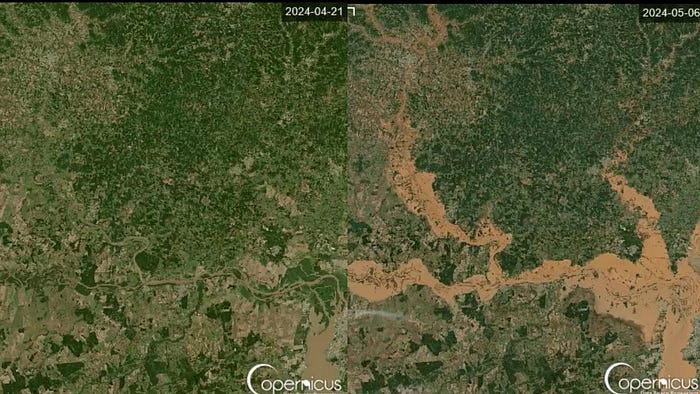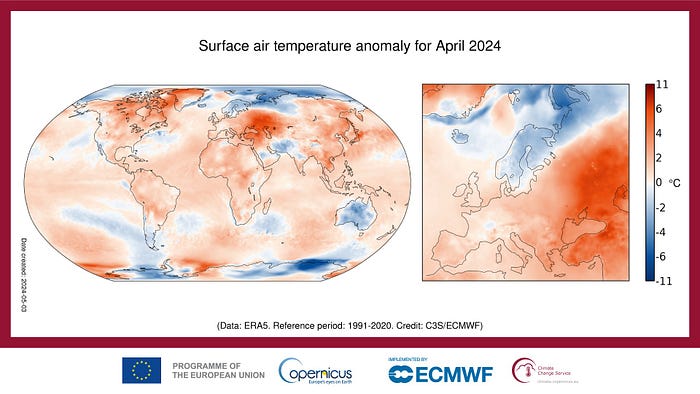THE ENVIRONMENT
Did you hear that more than a hundred people died in devastating floods in the South of Brazil? The number will likely rise since more than 130 people are still missing in the disaster region.
The Porto Alegre flood is a massive 'natural' disaster that made 155,000 people homeless, but you likely entirely missed the news. It drowned in the other news of an overflowing number of extreme weather disasters worldwide. You may have confused the photos of airplanes in a flooded airport with the ones you saw the day before from Dubai Airport. Or was it a flooded airport near Houston the day before?

I have worked on the increasing risks of climate change for several decades. First, as a diplomat, and in the past decade, it has often been the subject of my talks when I worked for international think tanks and as a public speaker.
Like you, I have seen climate change evolve from a predicted future risk to a daily source of humanitarian suffering for millions of people worldwide. In the past decades, it has also changed from a risk for other people in faraway countries to a personal risk that none of us can ignore.
Does anyone in Porto Alegre, the flooded capital of the southern Brazilian state of Rio Grande do Sul, have a moment to reflect on their past perceptions of climate change? Will they also have ignored it when they first learned about global warming? They likely have other things on their minds right now; the city is virtually cut off by the heavy rains that started last week.
The floodwaters block the main roads, and the airport and bus station are closed. Weather forecasters predict more rain for the region into next week. Five of the six water treatment plants are not functioning, so drinking water is urgently needed. Meanwhile, the risk for diseases like dengue fever has sharply increased. For many in Porto Alegre, life will never be the same, and they will wonder for years what changed to make this flood possible.
I still remember the days when most of us saw climate change as a severe risk, but one that we felt was somehow detached from our daily lives, a threat in a hard-to-imagine future in faraway places.
The mainstream media, for too long, naively tried to report even-handedly between the presumed two different schools of scientists, the 'alarmists' and 'realists,' thus reducing awareness of a looming global disaster.
I don't recall any of these newspapers ever having apologized for misinforming their readers for decades about the existential risk of climate change since they fell for the misinformation campaigns, complete with fake scientific-looking research, by the fossil fuel industry.
A record-breaking hot April
The world just experienced the hottest April on record. After eleven months in a row of these warmest-month-ever records, there is the risk of no longer paying attention to the news. I remember how I thought about climate change in previous decades when the data were less extreme. A first memory that pops up is a presentation where I mention that the atmospheric temperatures were 0.6 degrees Celsius warmer than pre-industrial times. That must have been some 15 years ago when I left my work in Vienna, where we had an early interest in the Organization for Security and Cooperation in Europe (OSCE) on the impact of climate change on international security.
My next position in the Middle East Department required a focus on energy; looking back at those days, I'm surprised how easily we could still detach fossil fuel policies from climate change concerns. There was awareness, but the sense of urgency to phase out fossil fuels was far less than it is nowadays. And since we still aren't as alarmed about climate change as we should be, that says something about the business-as-usual feeling that prevailed in those days.
By then, I had already started using Twitter to share information about climate change. That @alex_verbeek account still has some 300,000 followers on X. For years, these kinds of serious accounts on climate change had to fight an increasing number of bots promoting 'alternative facts.' Their confusing messaging may have changed over time (outright denial has become rare), but their misinformation campaigns never stopped and likely even increased.
You can no longer escape climate change
It is only in the past five years or so that it is hard to imagine anyone not having seen the impact of climate change. It may not be as devastating as in Brazil's example. Still, you may have had nights that you couldn't sleep because of the heat, or perhaps your suffering from climate change has so far been manifested by only mild inconveniencies such as a skiing holiday without snow.
Meanwhile, elsewhere on the planet, people feel the reality of climate change impacts with devastating effects. The primary victims are the poorest people in the poorest countries: precisely those who bear zero responsibility for the destruction of our living conditions on the planet.
But nobody can entirely escape climate change anymore. In these past five years, I have experienced more heatwaves in Europe than ever before. Forest fires became part of my holiday experience. And for the first time, I experienced nights in the Netherlands that were too hot to sleep.
A man installing air conditioning units told me he used to sell 80 percent of his equipment to companies. That changed in just a few years; now, eight out of ten clients want air conditioning in their homes. I also remember talking to a pest controller in Ottawa, who described all kinds of new animals he had to deal with that had followed the warmer climate northwards.
A week of extreme weather worldwide
There have been so many extreme weather events this week that it is hard to track them. Attributing them to climate change may take some time, but it is safe to say that many, if not all, have been impacted. The planet is behaving as scientists who warned of global warming had predicted for decades. These scientists also predict it will get worse, much worse, if we don't urgently stop emitting greenhouse gases.
Although many climate scientists participated in a recent survey about global warming in the future, it is hard for anyone to predict how much worse the climate crisis will become. Scientists have proven to be excellent forecasters when it concerns the impact of rising temperatures on the increase of extreme weather events or sea level rise. However, their scientific knowledge isn't worth much when asked to predict what politicians will decide about reducing greenhouse gas emissions in the next decade. It's our leaders who control the global thermostat and, thus, the future of humanity.
Heat wave in Asia
Meanwhile, the wave of climate extremes continues. Climate records were broken in 70 countries and territories worldwide in the first five days of May. The under-reported heat wave in Asia is an example. Temperatures above 46 degrees Celsius are no exception, and Indonesia, Malaysia, the Maldives, and Myanmar recorded new records. Dozens of people have been killed by heatstroke in Thailand. The UN has warned that heat is a 'silent killer' and that deaths due to heatstroke are widely underreported.
I have seen many extreme weather events, but I don't recall seeing so many in such a large area where billions of people live. Add to the Asian heat wave the extreme heat in Southern Africa and East Africa and the recent heatwave in the Sahel to get a near-global picture of extreme weather.
It is no coincidence that this record-breaking occurrence of extreme weather events occurs at a time when the warming of the oceans and the atmosphere is also record-breaking.

Since late March 2023, new records were set daily for global ocean surface temperatures for each date.
In February 2024, we reached the point where, for an entire year, the surface air temperature breached 1.5 Celsius above the pre-industrial average every single day.
Will the world know how alarming climate change has become? Yale Climate Connections looked at how much time the national broadcast channels ABC, CBS, NBC, and Fox spent addressing climate change during the record-breaking year 2023: less than one percent of their news time.
Expect more extreme weather events but not to hear much about them in less than one percent of airtime dedicated to climate change. That is, until the day that your city is the next victim of the deadly game of Russian Roulette, which we play with climate extremes that can hit anywhere, but you don't know when or where.


